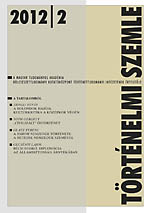Adatok Szokollu Musztafa és Kara Üvejsz budai pasák konszolidációs kísérletéhez
Reflections of the Efforts at Consolidation by Pashas Sokollu Mustafa and Kara Üveys of Buda
Author(s): Klára HegyiSubject(s): History
Published by: Magyar Tudományos Akadémia Bölcsészettudományi Kutatóközpont Történettudományi Intézet
Summary/Abstract: In the middle of the 16th century the local revenues of the vilayet of Buda were so much smaller than its expenses that the balance could only be restored by a sizeable subsidy arriving from Istanbul, which amounted to 15-20 million akçes (250 000 to 340 000 golden florins at the official rate) per year. By analysing the accounts of the period between 1571 and 1581, Gábor Ágoston has come to the conclusion that in the first part of the 1570s the subsidy fell to under five million, and ceased altogether in 1575, and thus the treasury at Buda became self-sustaining for some time. The present study aims at examining the extent to which the different sources of income contributed to the financial consolidation, by decomposing the summary items of revenue of unknown content, given in the accounts, into smaller groups containing the data of individual units – sancaks, settlements, various estates, or, in the best of cases, individuals. On the basis of tahrir- and cizye-defters, icmals, mukataa-accounts and customs-diaries it comes to the conclusion that the income of the treasury – that is, the revenue from the cizye, the sultan’s hass-estates and the mukataas – hardly increased in the 1570s, whereas the extraordinary military contribution, which was levied but once, in 1579, yielded some four million akçes. All the sources clearly attest that in the 1580s the taxpaying capacities of the population were on the wane. Although the tax registers of Kara Üveys, pasha of Buda, from 1579, which cover seven sancaks, reveal a surplus revenue of more than one and a half million akçes, only a fraction of it could be converted into regular income of the treasury. For the scribes registered as new the taxes of some five hundred settlements which lay far away in the Kingdom of Hungary, and their tax was impossible to collect. In the second half of the 16th century there existed only one source of revenue in Hungary the yield of which increased constantly: the customs levied on the export of livestock, before all cattle, to Western Europe. Most of the animals came from the part of the country under Ottoman rule. The pashas of Buda increased fivefold the customs duty within two decades, and Sokollu Mustafa Pasha organised into a uniform system the customs gates and ferries along the route of drive. The temporary consolidation of the treasury of Buda was the result of several decades of work, which was favoured by several internal and external factors, such as the period of peace from 1568 on, the twelve-year-long officeholding at Buda of Sokollu Mustafa, and the European agricultural boom. In 1591 there started a new war which was to last for fifteen years, and which not only involved a lot of destruction but also isolated the country from its European markets. The treasury of Buda collapsed, and never recovered any more.
Journal: Történelmi Szemle
- Issue Year: 2012
- Issue No: 02
- Page Range: 187-217
- Page Count: 38
- Language: Hungarian

